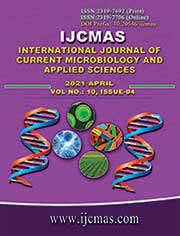


 National Academy of Agricultural Sciences (NAAS)
National Academy of Agricultural Sciences (NAAS)

|
PRINT ISSN : 2319-7692
Online ISSN : 2319-7706 Issues : 12 per year Publisher : Excellent Publishers Email : editorijcmas@gmail.com / submit@ijcmas.com Editor-in-chief: Dr.M.Prakash Index Copernicus ICV 2018: 95.39 NAAS RATING 2020: 5.38 |
Yogurt is a fermented probiotic milk drink produced by the action of bacteria which break down the complex compounds in the milk to produce more nutritious acidic product. Yogurt is famous worldwide due its characteristic flavour and taste. It is well known that it has potential to promote the health by improving the gut microflora, curing many diseases like diarrhea, intestinal disorder, type 2 diabetes and cardiovascular disorders. Yogurt itself highly reaches in protein, calcium, phosphorous, thiamine, folate, riboflavin, vitamin B12, niacin, zinc and magnesium. Considering the present trend, production of fortified food with high nutrients is essential. Yogurt has high popularity due to its versatile nature mainly amongst women, children and elder people hence; yogurt with essential nutrients can reduce the deficiency in the diet. At present many researches focused on the production of reduced fat fortified yogurt with minimum change in the sensory as well as physicochemical properties. The fortifying agents can have a chemical interaction with active compounds in the yogurt. In this review, the effects of milk fortification with various food components on physicochemical as well on sensorial properties of yogurt products are studied and described. The fortification described under the types of food components like carbohydrates, proteins, dietary fibres, minerals and vitamins.
 |
 |
 |
 |
 |